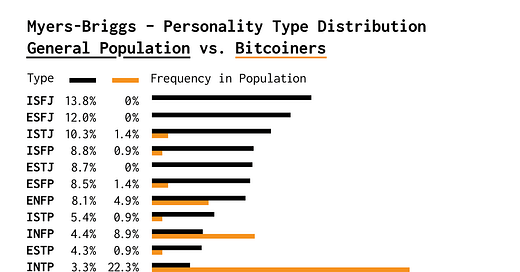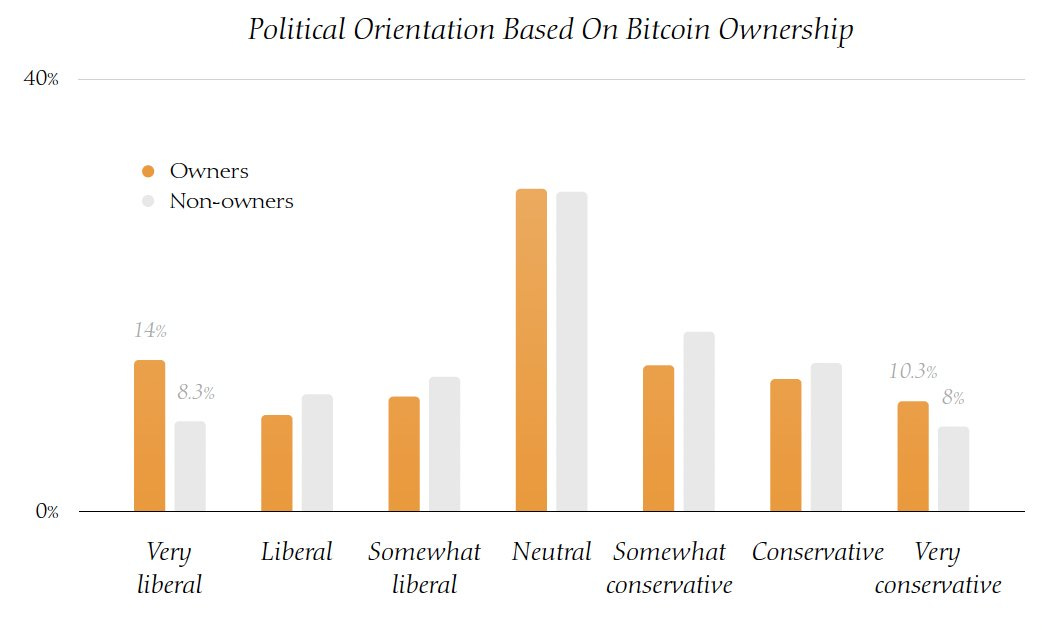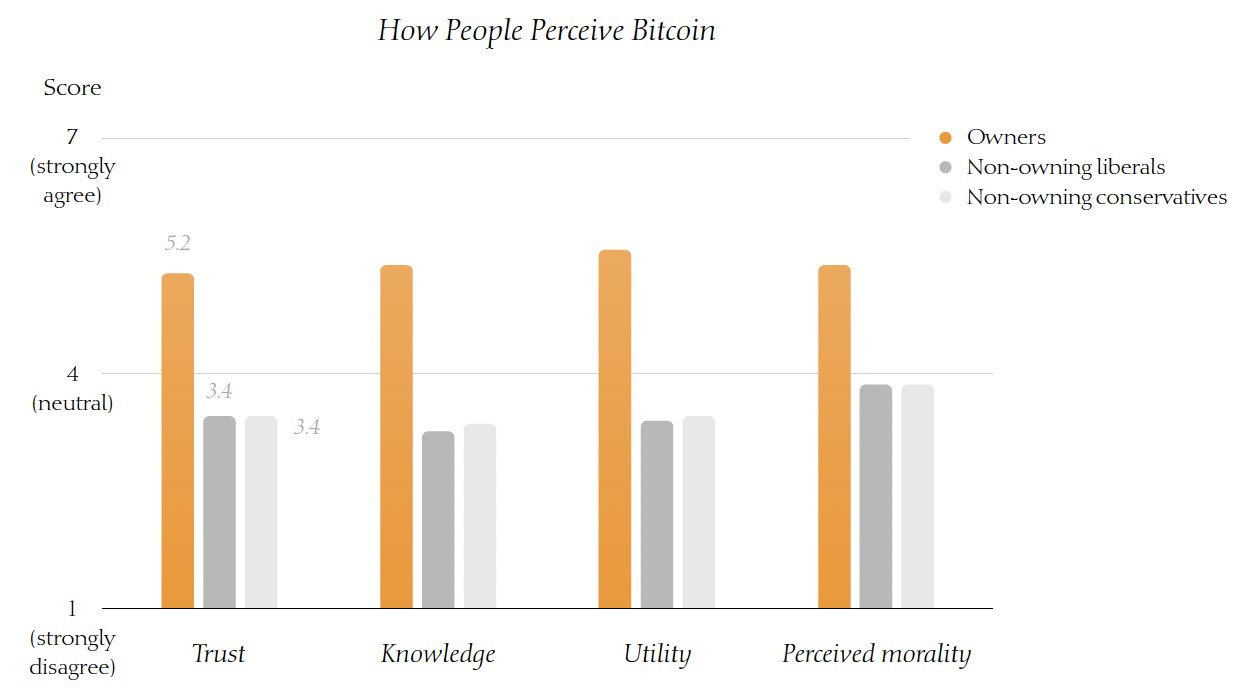Who are the Bitcoiners?
Certain Myers-Briggs personality types are heavily overrepresented amongst Bitcoiners
Brandon Quittem put together a little poll, asking 500 Bitcoiners to self-report their personality types, according the Myers-Briggs personality test (which you can do here).
The Myers-Briggs test identifies 16 distinct personality types, and was created by Isabel Myers Briggs and her mother, Katherine Cook Briggs, after reading Jung’s Psychological Types (1921).
Quittem’s survey found that, amongst Bitcoiners, there are some personality types which are heavily overrepresented and some which are underrepresented.
INTPs and INTJs
Perhaps the most standout reading from the chart is the overrepresentation of INTPs (“The Thinker” archetype) and INTJs (“The Architect”). Roughly ~5.4% of the general population is either INTP or INTJ, but they account for 51.3% of Bitcoiners. That is to say, these personality types are almost 10x more prevalent in the Bitcoin community than in the general population. Similarly, INFJs comprise just 1.5% of the population, but almost 10% of Bitcoiners.
The “I” is for “Introvert”. This doesn’t necessarily mean that they are socially dysfunctional or shy; but they tend to “recharge” through solitude, reflect more introspectively, and are more considered in their communication style.
“N” stands for “Intuition”. These people are adaptable and open to change, future-orientated, and focus on the big picture rather than details. Interestingly, these people are more likely to use metaphors than their peers, and enjoy playing with hypothetical scenarios more.
“P” is “Perceiving”. These people are typically more spontaneous, flexible and exploratory.
“J” is for “Judging”. This means that these personality types prefer structure, routines, clear plans, etc. They will typically only take large decisions once they feel that they have ample information.
ISFJs and ESFJs
By contrast, whilst ISFJs (“Defender” / “Protector”) and ESFJs (“Consul” / “Caregiver”) make up ~25.8% of the general population, not a single Bitcoiner who responded to Quittem’s survey fell into these categories. The “I” and the “E” show that these people can be either introverted or extroverted, but the common traits that they share are:
“S” for “Sensing”. These people typically focus more on the present than on abstract concepts.
The “F” is for “Feeling”. These people have decision-making processes largely influenced by emotions.
“J” is for “Judging”, as covered above.
Requires more data
There are a few ways that the data ought to be critiqued.
Firstly, the sample size of 500 people isn’t particularly large.
Secondly, those who responded to the survey were largely Quittem’s Twitter followers, who (although dominantly Bitcoiners) may be following him for reasons that other Bitcoiners wouldn’t.
Lastly, the survey was conducted in 2020, and the results were posted in 2021. The world has changed significantly since then, and adoption of the asset has increased tremendously; as the asset becomes more widely-adopted and perceived as less risky, one may expect ownership to more closely represent averages across society — the sort of people who were buying in 2011 were very different from the people buying in 2021. The people buying in 2031 may treat the asset completely differently to how it was treated in 2021.
Are Bitcoiners narcissistic, psychopathic sadists?
A study was published in June this year by Shane Littrell, Casey Klofstad and Joseph Usinski, titled: “The political, psychological, and social correlates of cryptocurrency ownership”. (Note: this study was not bitcoin-specific.)
2,001 Americans were polled in 2022, of which 30% reported that they either currently own or have owned cryptocurrency in the past. The study’s authors then compared this 30% with the rest, to see how their personalities differed.
According to the report:
“Crypto ownership was associated with belief in conspiracy theories, “dark” personality characteristics (e.g., the “Dark Tetrad” of narcissism, Machiavellianism, psychopathy, and sadism), and more frequent use of alternative and fringe social media platforms. When examining a more comprehensive multivariate model, the variables that most strongly predict cryptocurrency ownership are being male, relying on alternative/fringe social media as one’s primary news source, argumentativeness, and an aversion to authoritarianism.”
It makes sense that the most accurate predictors for ownership would include consuming fringe media, being argumentative and having an aversion to authoritarianism, since Bitcoin has a strong ideological component that opposes the status quo.
As Keiser would put it:
“Bitcoin gives the world confidence and independence to stage a Global Insurrection Against Banker Occupation (GIABO). Bitcoin is the currency of resistance.”
However, it also makes sense because those are some of the traits most closely-associated with INTPs and INTJs. Both of these traits comprise the most sceptical people.
High correlation with knowledge of Bitcoin
A more recent survey, and larger than the first two by far, was conducted by Troy Cross and Andrew Perkins in July, as part of The Nakamoto Project. The report specifically covered bitcoin ownership (not including the wider cryptocurrency market), and was intended to gather data about demographics and political stances of holders.
3,538 adults in the the US were polled across the country, across the demographic and political spectrum. The survey yielded some surprising results. Firstly, despite Bitcoin’s counter-culture ideology, bitcoin ownership didn’t show any particular correlation with adherence to right-wing politics. Moreover, it seems that the far left is actually more prevalent in Bitcoin than in the general population: 14% of Bitcoiners versus 8.3% of Americans. But most people are pretty moderate.
The report published several findings, but found no correlations between ownership and race, ethnicity, religion, relationship status, income, education, or financial literacy.
According to Cross:
“Bitcoin owners look like other Americans in most demographic respects, with one striking exception: they tend to be younger and male. What correlates most strongly with Bitcoin ownership is not who you are, so to speak, but how much you know about Bitcoin, and whether you think it is useful, trustworthy, and good.”
Cross’ explanation, that the greatest predictor for whether or not someone is a Bitcoiner is closely correlated with being young, male, and having knowledge of Bitcoin, makes the most sense to me. Personally, I’ve yet to encounter a single person who understands the asset but can’t see the value in owning it (regardless of age or gender). After all, if most people understood just how awful their local currencies are, they’d never touch them with a barge pole.







